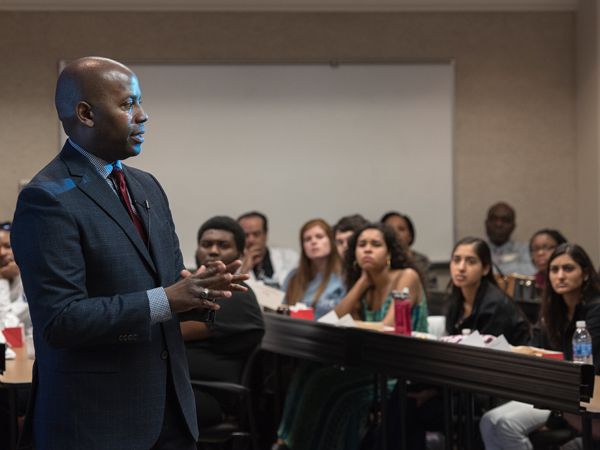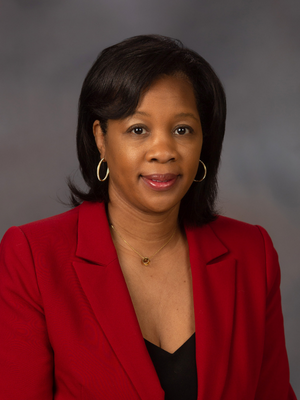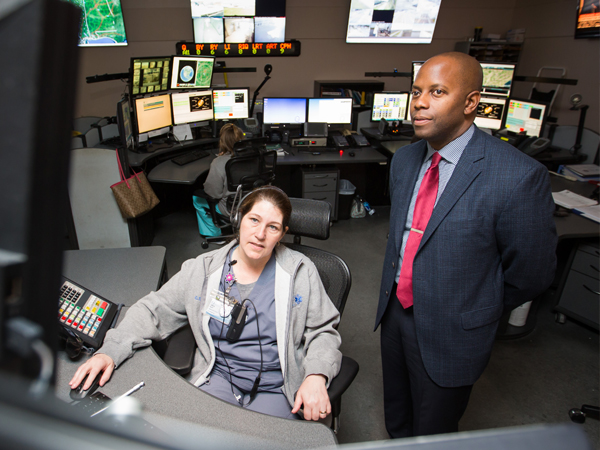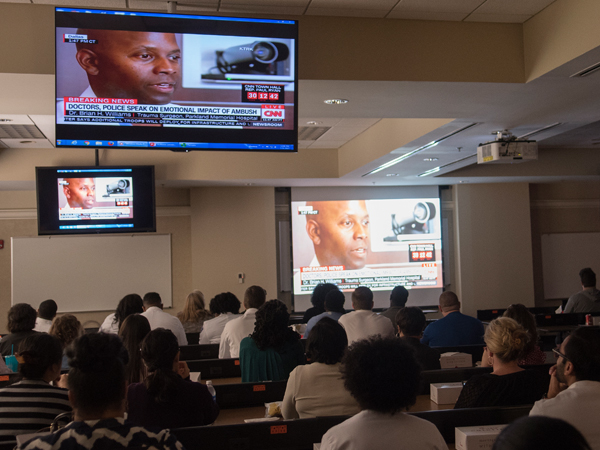Texas surgeon breaks silence on racial disparities

Since the age of 4, Dr. Brian Williams, a black man, an Air Force veteran, a trauma surgeon, an associate professor of surgery and a general surgery residency program director at UT Southwestern Medical Center in Dallas, experienced acts of prejudice - some small and some not so small - that gave him the perception that he was inferior because of the color of his skin. Yet he remained silent.
But on July 7, 2016, events occurred that would change his life and end his silence.
On that day in Dallas, 12 police officers and two civilians were shot by a sniper during a protest of police brutality against people of color. Williams, lead surgeon on call at Parkland Memorial Hospital that day, fought to save the lives of seven of those officers, despite his inner turmoil as a man who has faced unfair treatment because of the color of his skin.
Williams was invited to the University of Mississippi Medical Center by the UMMC Office of Diversity and Inclusion to tell his story last Tuesday and to encourage students, faculty and staff to end their silence as well.
His talk, “Critical Mass: Examining Race, Violence and Medicine in the 21st Century,” was the first in a series of “Inclusive Conversations” designed to open dialogues among members of the Medical Center community. The goal is that by sharing personal experiences, individuals will gain a better understanding of different perspectives across campus.

Dr. Juanyce Taylor, chief diversity and inclusion officer, said since assuming her position, she's heard concerns from both employees and students about the lack of opportunities to interact and better understand the viewpoints of others.
“We all have our biases and can easily make assumptions or generalizations of others,” Taylor said. “The idea behind the lecture series is to provide a way to give the UMMC community a space to first listen and learn. My goal is that those attending these lectures will create open and honest discussions.”
Williams opened the discussion by sharing his stories of what Chester M. Pierce, Harvard professor and psychiatrist, called "racial micro-aggressions." Psychology Today defines micro-aggressions as “everyday verbal, nonverbal and environmental slights, snubs or insults, whether intentional or unintentional, which communicate hostile, derogatory or negative messages to target persons based solely upon their marginalized group membership.”
These acts throughout Williams' life culminated in one episode a few years ago that he described as a “final straw.”
He was waiting for his ride to the airport, standing on the sidewalk outside the garage of his home, a high-rise apartment complex in downtown Dallas, with his luggage beside him. Neighbors reported a black man acting suspiciously and police responded to question him. The officers asked to see his identification.
“I very gingerly reached into my back pocket - no sudden moves - pulled out my wallet, showed them my driver's license,” Williams said. “I was essentially showing them my papers, all the while just hoping that I don't get beat up or that I don't get physically harmed.”

Before the lecture, Williams takes a tour of Mississippi MED-COM, where communications specialist Candice Talley describes how the department aids agencies throughout the state during emergencies.
Williams said that day revealed to him that even though he had “done everything that this society asked” of him, he was still seen as a threat.
“I'd gone to college. I served my country. I earned an advanced degree,” he said. “I was working in a profession that gives back to humanity, and none of that mattered, because to many, I was still guilty, inferior, suspicious, a threat.”
Williams said this event, like many others that had preceded it, helped shape his silence.
“This had been happening so long that I was internalizing,” he said. “It was part of the fabric of who I was without me even realizing it.”
Williams said it was easy to stay silent for fear of the repercussions of speaking out, like being labeled as "sensitive about race" or an "angry black man," to the detriment of his career.
“I traded authenticity for acceptance,” he said. “What I did not appreciate was the price I would pay for staying silent: this insidious erosion of my dignity and self-worth.”
In the months leading up to the Dallas sniper shootings, Williams said he had been questioning his identity as a black man and as a trauma surgeon “who routinely sees the results of violence, particularly against people who look like me.”
He asked what his role was in all the things that had happened. He asked himself if he was doing enough.
Then on July 7, when page after page rang out, signaling the arrival of seven police officers shot, three in critical condition, Williams was not thinking about race. He was focused on helping his team save lives. Three of those seven transported to Parkland did not make it. Five officers in all were slain.

Lecture attendees watch a CNN recording of Williams' news conference.
In the aftermath, a press conference was called. Williams was asked to participate, but he had no intention of speaking and didn't even want to attend at first.
“As the press conference was progressing, I sensed there was not going to be any discussion of what I felt was a really relevant subject: What got us to this point,” Williams said. “That was not coming up. I thought to myself that something had to be said. 'If not you, Brian, then who? Probably no one. If not now, then when? Probably never.'”
Williams broke his silence in a very public way in front of the world.
“I talked about this lack of open discussions about racism and the vestiges that remain in our society and about the escalating violence that did not seem to be abating but seemed to be getting worse,” he said.
“My silence ended on that day. Now I'm asking you, what is keeping you silent?”
Williams emphasized that it is important for everyone, regardless of race, social status or education, to speak out against racial disparities observed in daily life.
“I'm hoping that at least one person will leave this room thinking differently and choosing to do something differently,” he said.

To find out about future presentations, visit the Inclusive Conversations webpage. The lectures will be scheduled monthly.


